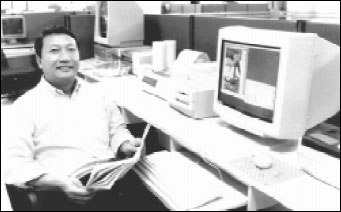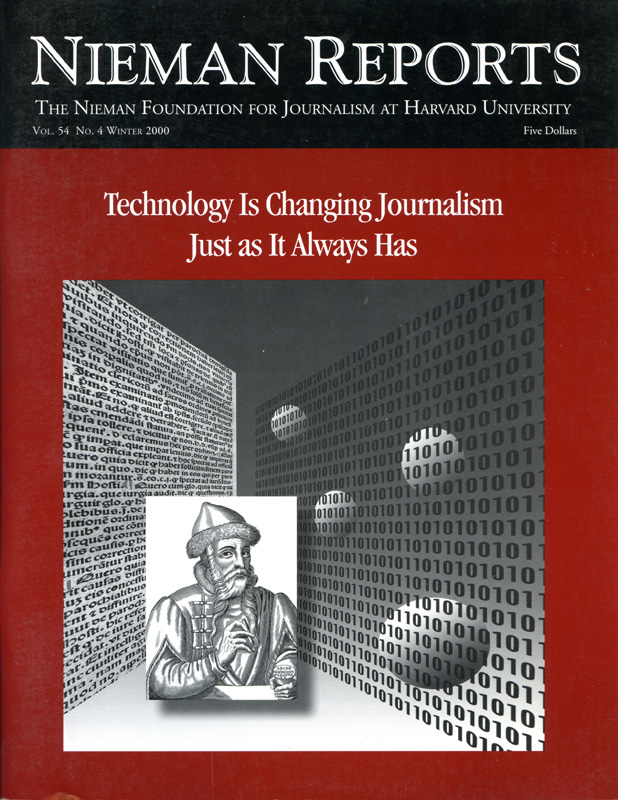I still remember the scream. In fact, everyone at the weekly feature section still remembers hearing it.
It happened early in 1999. A team of foreign computer experts was in the editorial department training reporters, rewriters, sub-editors and editors to use a new computer system—pagination—that would enable us to write and edit copy and lay out pages on the screen. Odd words like “dongle” and “Dr. Watson” were unknown to us at this time, since these are technical terms familiar only to computer experts. Nor were any of us yet aware of the hidden hazards that we’d soon learn were associated with these seemingly harmless sounding words.
On that hot Thursday afternoon, we became all too aware.
One of my reporters was putting finishing touches to her 2,000-word article when a “dongle” flashed across the screen. Wham! Her hard day’s work instantaneously disappeared into thin air. Her scream bounced off the walls and reverberated around the newsroom.
Now, nearly two years later, we have learned to live with the strange computer coding, workflow charts, and a terrifying string of unexplained events that, fortunately, has now become less frequent. Today, when reporters “lose” their copy, our production team knows how to trace and retrieve it.
Indeed, we have come a long way from the days when the sub-editors would hover around the paste-up section of the newsroom, waiting for the typesetter—a formidable-looking machine that churned out glossy paper—to give the paste-up artists the bits of paper needed to finish the job at midnight. Sometimes they had to wait 15 to 30 minutes to correct one spelling mistake.
The old editing and page-making system also required a lot of running around. In the pre-pagination days, The Bangkok Post editorial area spread out over three floors in the atrium-like main office. The news section was located on the top floor. After the copy was edited, the layout sub-editor would gather the stories and pictures, sketch out the page on a sheet of paper called a “dummy,” and put it in a basket. The copy boy would pick up the dummy and walk down three flights of stairs to the paste-up section on the other side of the building. The proofed pages would then be brought upstairs for the chief sub-editor to sign. All this required an awful amount of stair climbing. One day somebody finally dropped a pair of strings down from the third to the first floor. Stories, pictures, press releases—and sometimes a box of pizza—would be hoisted up and carried down by rope instead of legs.
Now these amusing routines are gone, as machines have replaced rope and shoes. And, not surprisingly, the pagination system has instilled a new work pattern. Stories are assigned and edited on the same screen. Simple pagemaking can be done with a few clicks of the mouse. The ubiquitous typesetter is gone, and we no longer have to wait 30 minutes to change “oo” into “o” in “loosing my way.” And, yes, we have learned to use the Internet—the ultimate information superhighway that many of us had started to travel even before the “dongle” came along.
At first, we were ignorant of the Internet’s potential, and we were also afraid. But within three years, the Internet has proven to be very popular in the newsroom—even for older journalists who may not have felt they’d be especially comfortable with doing computer research. At the Perspective section, where I’ve worked for six years, we practiced investigative journalism long before the Net and computer-assisted reporting became easily accessible. We hounded politicians, interviewed people on the streets, and obtained crucial information by nurturing personal connections with inside sources. In short, we did all the things good reporters are trained to do, and the personal touch of our reporting was crucial because government agencies tended to withhold state information, and we were often led to believe that statistics were not systematically kept or simply did not exist.
Imagine my delight when I found out that such information is available online from state agencies. The Budget Bureau now has a database of information derived from government expenditures. The Royal Thai Police Special Crime and Transnational Crime Center has its own Web site where I can read profiles of transnational criminals, and I can e-mail the Office of National Education Commission for information about home schooling, learning reform, and the licensing of teachers. All this information can be obtained with a few clicks of the mouse.
When a former Thai deputy finance minister was arrested in California in March, we had to rely on foreign wire services to keep abreast of the news. Then someone gave me the e-mail address of a Thai journalist living in California, and I assigned him to interview the ex-minister. The story was mailed to me along with photos as attached files. There were no diskettes that could be damaged in the mail. No waiting for the mail at all. Nor was there any need to travel thousands of miles across the globe to do this interview. And I was able to get this story into print within one week.
The speed of the Internet is truly amazing, and it is what makes it such a powerful tool for communication. The most difficult part of using the Internet is in finding the best and most credible information. Most Thai government agencies have Web sites, though information from before 1995 often must be located elsewhere. And all the leading newspapers also have Web sites, though it is unclear how many people here actually rely on the Internet for their news. A lot of the more popular sites offer entertainment, gossip, horoscopes, contests, chat rooms and dating services, and though news is offered, it isn’t what drives traffic on the site.
At Perspective, even in this age of the Internet, we still adhere to the old tried and tested ways that journalists have always gathered information—through personal contacts with sources. I still take time on a regular basis to meet with news sources for lunch. After all, you cannot e-mail all your potential news sources in a country where fewer than five percent of households have access to personal computers.
And it is still a great joy for me to preside over the weekly news meeting, where we confront issues without being confrontational. There were times when a reporter and a sub-editor nearly came to blows over a few missing lines, but eventually someone would buckle down to listen to others. It is fortunate that this human proactive exercise is alive and well despite the onset of the Net-mania. I can’t imagine what life would be like if we had to conduct our news meeting online. You simply cannot talk to the computer as you can a human being. Besides, if we carried on our conversations by computer, somebody would just need to push the wrong key and “dongles” would steal our words away.

The author at a Bangkok Post computer.
Songpol Kaopatumtip, a 1987 Nieman Fellow, is editor of the Perspective section of The Bangkok Post, a leading English-language newspaper in Thailand. Perspective is a weekly Sunday section involving investigative reporting, analyses and commentaries. A Perspective article on human consequences of the failure to protect the environment was named the second winner of the Lorenzo Natali Prize for Journalism in 1998.


